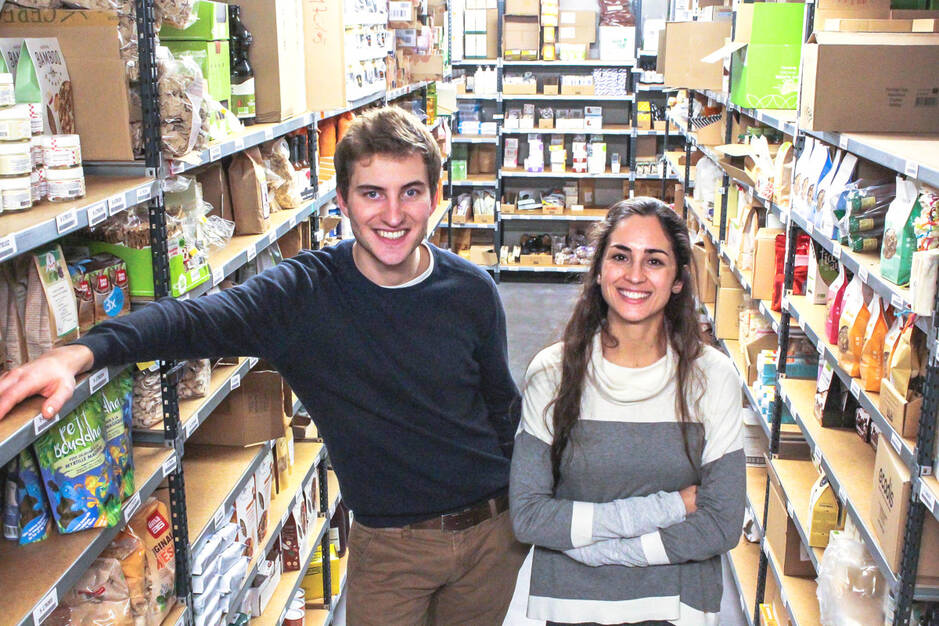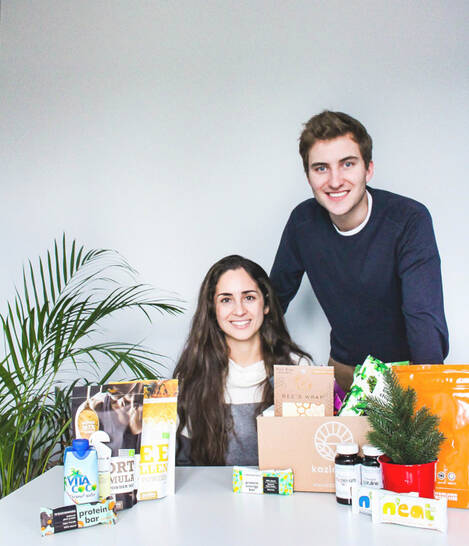Interview with Alain Etienne, co-founder of Kazidomi, an eCommerce of healthy products
Learn more about Alain, his background, his links to the HEC Community and his promising start-up!

Alain Etienne (H17) has the passion for entrepreneurship since he was a child. He launched Kazidomi when he was still a student, with Emna Everard, in 2016. This year, he plans to increase their product catalogue by 30%, to move their warehouse in a surface 8 times bigger than their current one, while being in a middle of their new fundraising.
What led you to become an entrepreneur?
My name is Alain, I have a passion for entrepreneurship. Already as a kid, I was always trying to buy and sell things when I saw opportunities. I remember when I was 10, some classmates’ parents were telling mine that a kid was ruining their children selling them plenty of small figurines. Well, it didn’t take long for my parents to realize this kid was me. Very early, I had that desire of trying to sell. It’s been an interest for me ever since: how brands were able to convince new customers, how social media were used by companies, how data could be leveraged for marketing purposes, etc. As a result, I studied management as an MIM at HEC (H17) and I then participated in the double degree with MIT in Boston for my last year to specialize in entrepreneurship.
Why did you decide to "make the jump" to start a business?
I launched Kazidomi when I was still a student. I had a passion for healthy living and my co-founder as well. She was convinced that she wasn’t fit for a corporate job, but I was more balanced. It’s difficult to tell your parents you will start a risky business, without being paid after having studied in the best schools. Ma passion kept me involved in Kazidomi but I started my career at McKinsey to pay back my student loans. I was working day and night to cope with the workload. Although I was successful at McKinsey and got promoted very fast, at some point I realized I was being energized by the startup and not by the corporate world. It was clear to me I had to join full time and that’s what I did.
Can you present your company in a few words?
Kazidomi is an eCommerce of healthy products delivering the best organic and responsible food and cosmetics all over Europe. We sell 2000 SKUs (product references), all non-perishables. We work with a subscription model where our members buy an annual membership at 100€ and in exchange they can buy all our products at wholesale price (20 to 50% discount). This is a game changer for eCommerce where challenges are mainly (i) the average basket size (if it’s too small, the shipping and picking/packing are too expensive) (ii) the customer loyalty (because competition is high, and clients often switch between online shops). For us these two challenges are solved as customers buy a lot from us and are very loyal. We are growing at a fast pace (+20% members per month during 2018) and we now employ close to 20 people. We’ve been expanding at a crazy pace!
What types of risks were you willing to support?
We invested our own money in the project first and also our time and we also put our souls from day 1. It gets even more realistic when you hire your first employees and when you raise funds because it’s not only about yourself anymore, other people are impacted. At that point, you know you’re committed and ready to do anything it takes to make it work. On the other hand, so many times your business is at risk, something bad happens and you need to find a way to make it work. It’s a bumpy road and you are always aware that it could go wrong any time.
How would you define success for yourself and / or your business?
My success is now very interlinked with the one of our business. In the first years, you’re 200% dedicated and you eat, think, sleep, speak and work for your project, you only have that in mind. Success for the business is to continue delivering on its mission: making healthy products accessible to everyone in Europe. In practice it means offering the best products, the cheapest possible to a maximum number of people.
What are the main difficulties you have encountered?
The fact that you have to learn very fast. You don’t know how to conduct interviews, write a contract, build a website, raise funds, run marketing campaigns or build a social media strategy. Because of all this ignorance, you often doubt yourself and believe that there is a right way to do these things. I remember I was always thinking that there are experts out there working for large companies. In practice, what you realize later is that if you read a few books, ask for advice and make things in a smart and logical way, you will be successful with all of these challenges. It’s difficult to overcome this fear of ignorance and really start trying. For us, the main challenge was to take ourselves seriously enough to make the real jump but as long as you don’t spend real money on marketing campaigns for instance, nothing will start moving in the right direction.
For you, what skills does a business founder need to have?
Resilience. You cope with new challenges every day, it’s a lot of fun, it’s a great experience but you must be prepared to face all these challenges every day. For an entrepreneur, the day is never really over and there is always more to do. For example, we had crazy growth this summer, but that has put a lot of pressure on the logistics processes, so we had to optimize the order preparation systems. We worked on that to develop top-notched systems with scans, ipads, automation, etc. which was super cool. However, in the meantime, there was a strike from the postal service, so we had to take care of hundreds of customer support requests. We decided to automate customer support with an AI bot, but in the meantime, we realized we had to move our warehouse because our current warehouse got too small, etc. every good thing brings new challenges. I personally find that very exciting, but other people find that exhausting.
How did you find and choose your co-founder?
Well, I knew my co-founder from long before. I blindly trust any decisions she makes and vice versa and we are extremely complementary. We are also very transparent in terms of ambition; all of these are crucial elements for success between co-founders.
How did you finance the first steps?
We first invested our own money in the company and we bought 350 different products. It was only food and I remember thinking “worst case, we have food for the next year!” Then we developed our project and grew to a more mature business model so we were able to raise from a business angel. That funding helped us to hire our first employees and extend the product catalogue. We continued growing until being big enough to raise from more private investors. The good thing is that all of these investments can be leverage with debt as we have inventories and warehousing machines that banks can get covenants on. For 2019, we’ve got big plans: increasing the product catalogue by 30% and moving our warehouse in a surface (8 times bigger than our current one!), and to achieve this, we are in the middle of our next fundraising (about 1 million euros).
A big part of what we will do in 2019 will be to expand the Kazidomi brand. We already have a few products with our own brand but it will increase a lot in the coming months. This way, we will be able to offer the best products at the best prices.
Why have you chosen to join HEC Paris?
HEC has an unrivaled network that helps you thrive in any career, that’s really exceptional. I was also interested in the great freedom you get at HEC to try things you want to try. When I arrived at HEC, I wanted to organize a business competition. I went to the administration and told them and they just said “ok, you can use the Hall d’Honneur”. So I did, and I launched the HEC Business Game within a few months, and it’s still running today.
I also liked the diversity of programs, for instance, my double degree was something I never expected doing when I arrived, it’s really full of opportunities. Going there gave me exposure to the US start scene that is a bit more advanced than the European one, it was really interesting. I also learned a lot from classes at MIT where everything goes around technology, which is something I was missing a bit in my previous business studies.
What links do you have with Alumni / the HEC Paris community?
I continue to have connexions with HEC when possible. For instance I gave a class in the digital major with Jean-Remi Gratadour. We also hire from HEC or take interns doing their gap year.
What is the best advice or the most memorable memory you remember from your stay at HEC Paris?
For me the most unique moment at HEC was the graduation day. It’s really a moment of exception. When you enter in the room, and you see everyone cheering, it’s very emotional. Singing the lac du Connemara afterwards was kind of closing it all in one of the strongest moments of my life. I had two graduations the same day, MIT and HEC, but for nothing in this world I would have missed the HEC one!
At your level, how would you save the world?
First we are helping people save money on their healthy groceries (we have already helped people save more than one million euros). We are also offering free subscriptions to people who can’t afford buying it themselves (we often target some specific profiles, like students, teachers, nurses, etc.). On top of this, part of our sales are often given back to NGOs we support (Unicef, Plan, Care, etc.)
Secondly, there is a strong effort in the service we provide, we only source the best products, with ethical suppliers that we control, when possible we bypass the intermediaries to only work directly with the producers, which then helps us pay them a fair price.
Finally, it’s about informing, about what people should eat, what the impact is. We offer more plant-based alternatives, zero-waste products, etc. to help people live a more sustainable life.
This ethical aspect of doing business is super important to us, which is why we are planning on becoming aBcorp in 2019!
"What matters is that you build a business you are passionate about, that you work with people you trust, that you provide a good service to customers, and ideally even that you have a positive socio-environmental impact. "
What is your first advice to entrepreneurs?
My advice is to avoid playing the startup game that the media keep putting forward. They are painting an image of startups that is not the right one (and to be fair, startups play a great role in that to gain visibility). It’s all about fundraising more and more, creating a big fuzz, introducing big data and artificial intelligence, and disrupting a market, etc.
All of this is great, but in the end, what matters is that you build a business you are passionate about, that you work with people you trust, that you provide a good service to customers, and ideally even that you have a positive socio-environmental impact. Sometimes being a bit slower, and making the right choices, keeping profitability in mind is a good decision. I like to think that anyone who is not an employee is an entrepreneur. If you open a restaurant, a bakery or an accounting firm, you are an entrepreneur. I would advise to focus on building the business you will love and not on how much money you can raise from a VC firm. In the end, raising fund is only about spending, but it’s not impressive to be able to spend, anyone can do that. What is impressive is to do a lot with little investments. I really think entrepreneurs are better off having small fundraising, step by step, to unnecessary dilution, learn and find the right partners. As you grow, your worth will be greater and you will know what type of investors you need to have on board for the longer term.
Creation date : September 2016
Activity area : Healthy products eCommerce
Program followed at HEC Paris : MIM, with double degree at MIT
Founder (s) : Myself with Emna Everard
Number of employees 20

